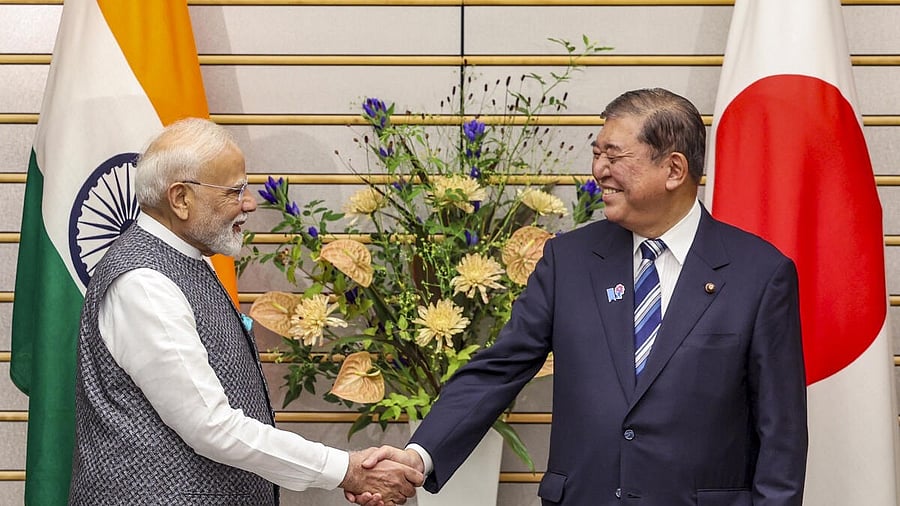
In this image released on Aug. 29, 2025, Prime Minister Narendra Modi with his Japanese counterpart Shigeru Ishiba during the 15th India-Japan Annual Summit, in Tokyo, Japan.
Credit: PMO via PTI Photo
New Delhi: India and Japan agreed to expand economic and security cooperation, as Prime Minister Narendra Modi, just ahead of his meeting with Chinese President Xi Jinping, joined Prime Minister Shigeru Ishiba in Tokyo on Friday in expressing “serious concerns” over the militarisation of the disputed features in the East China Sea and the South China Sea.
Modi and Ishiba set a new target of 10 trillion yen or $68 billion investment from Japan to India in the next 10 years. The two sides signed an ‘Implementing Arrangement’, defining the terms and conditions for cooperation between the Indian Space Research Organisation (ISRO) and the Japan Aerospace Exploration Agency (JAXA) on the Chandrayaan 5 mission of India. They also inked a Memorandum of Understanding to advance cooperation in supply chain resilience for critical minerals, including through the development of processing technologies, joint investments for exploration and mining and efforts for stockpiling.
“India and Japan are fully committed towards a free, open, peaceful, prosperous, and rules-based Indo-Pacific,” Modi said as he and Ishiba jointly addressed media-persons after the meeting. “We have shared concerns over terrorism and cybersecurity. We also have shared interests in the areas of defence and maritime security. We have jointly decided to further strengthen our cooperation in the fields of defence industry and Innovation.”
“Japan and India are both responsible for maintaining and strengthening a free and open international order based on the rule of law,” said Ishiba.
The comments made by the two prime ministers were apparently intended to send a message to China, which was accused by its neighbours of territorial aggression, not only along its disputed boundary with India, but also in the East China Sea, South China Sea and the Taiwan Strait.
The two prime ministers “expressed serious concern over the situation in the East China Sea and the South China Sea”, according to a joint statement issued after. the meeting on Friday. “They reiterated their strong opposition to any unilateral actions that endanger the safety as well as freedom of navigation and overflight, and attempt to change the status quo by force or coercion. They shared their serious concern over the militarisation of disputed features.
They reaffirmed that maritime disputes must be resolved peacefully and in accordance with international law, in particular the UN Convention on the Law of the Sea (UNCLOS).
An Arbitral Tribunal constituted on a request from the Philippines under the UNCLOS delivered a unanimous decision in 2016, rejecting China’s expansive claims in the South China Sea. China, however, declined to adhere to the award of the arbitral tribunal.
Modi subtly hit out at Beijing even as he would fly to Tianjin in northern China on Saturday to take part in the Shanghai Cooperation Organisation’s summit. He would have a bilateral meeting with Xi on Sunday, the second between the two leaders after the end of the military stand-off in eastern Ladakh on October 21, 2024, opened up opportunities for India and China to bring the bilateral relations, derailed over the past few years, back on track.
Modi and Ishiba on Friday announced the launch of a Japan-India AI Cooperation Initiative, which is aimed at deepening bilateral and multilateral cooperation on artificial intelligence, including Large Language Models (LLMs), establishing platforms for exchange between industry and academia, supporting joint research projects, and facilitating the development and operations of data centres in India with support from Japan. They also announced the Next Generation Mobility Partnership (NGMP) as a framework for comprehensive cooperation in infrastructure, logistics and mobility, building on Japan’s support to India’s first high-speed rail corridor between Mumbai and Ahmedabad. The NGMP sets the stage for the manufacturing of Japan’s most advanced bullet trains in India, apart from cooperation in functional signalling and operational control systems, seismic-proofing, AI-based maintenance and monitoring, energy transition in the railway sector, advanced metro rail systems and mass rapid transit systems.
The two sides agreed on an action plan to promote a two-way exchange of 500,000 people between India and Japan, particularly 50,000 skilled and semi-skilled personnel from India to Japan in the next five years. A Memorandum of Cooperation on the Joint Crediting Mechanism was signed to facilitate the diffusion of decarbonising technologies, products, systems, and infrastructure, contributing to India’s greenhouse gas emission reduction goals, promoting Japan’s investment in India and India’s sustainable development.
With President Donald Trump imposing a 50 per cent tariff on India’s exports to the United States, Modi on Friday called upon industry leaders in Japan to invest more in India.
“Japanese companies have invested more than $40 billion in India. In the last two years alone, there has been private investment of $13 billion. JBIC says India is the most 'promising' destination. JETRO says 80 per cent of companies want to expand in India, and 75 per cent are already profitable,” Modi said at a business event a few hours after he arrived in Tokyo. “Which means, in India, capital does not just grow, it multiplies!”
